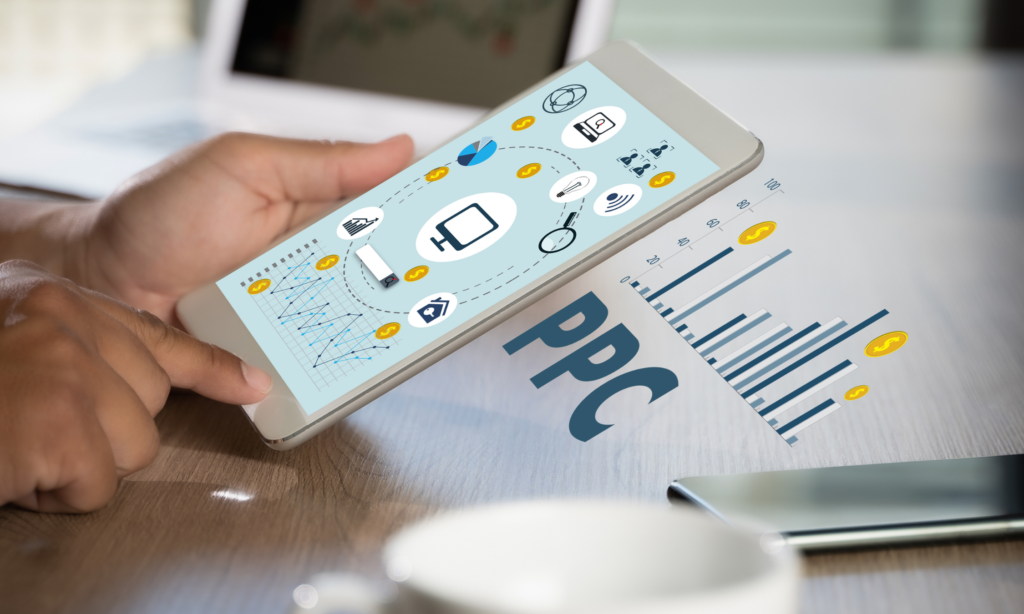Many business owners struggle to promote their e-commerce platforms effectively and affordably. Without a solid marketing strategy, they risk losing potential customers to their competitors, getting low traffic to their website, and failing to achieve their business goals. One of the most reliable methods to improve presence in the digital environment is PPC advertising. Below, we’ll explain how PPC advertising works and how you can use it to grow your e-commerce store.
What is PPC Advertising?
If you’ve ever wondered how to reach customers who are looking for exactly what you offer, PPC marketing is the answer. PPC stands for pay-per-click, and it’s a form of digital promotion that shows your ads to users who demonstrate an interest in your product or service. To be more exact, these ads appear on web pages or search results after a potential client uses a search query that matches your chosen keyword. To make your ads more relevant, you can set up a PPC campaign with parameters such as user location, interests, intentions, demographics, and others.
The best part is you only pay when someone clicks on your ad and visits your website. This means you can control your budget and get the most out of your advertising spend.
PPC is a flexible and far-reaching tactic for e-commerce businesses to meet their marketing goals. In particular, it makes it possible to:
– Drive qualified traffic to the website;
– Attract customers interested in purchasing a product or service;
– Grow your e-commerce store’s audience;
– Increase brand awareness and recognition;
– Boost profitability;
– Inform the target audience about new products, offers, events, etc.
According to statistics, more than 60% of internet users don’t notice any difference between paid and organic search results. They are likely to click on your ads and check out your e-commerce business. This is what makes PPC an effective method to deliver your marketing message to prospects.
Types of PPC Ads

PPC comes in various forms to help you reach potential customers online. Each type has it’s unique features and offers a number of benefits based on your goals and audience. Here are the most common types of PPC advertising:
– Search ads. These are the ads that appear on search engine results pages (SERP) when users type in a keyword related to your product or service. Search ads are great for capturing users who have a high intent to buy or learn more about your offer.
– Display ads. These are the ads appearing on various websites that are part of a larger network, such as Google Display Network or Meta Audience Network. Display ads have text, image, video, or interactive formats. Normally, they complement the general content of the web pages on which they appear. Display ads are ideal for building brand awareness and reaching people who have specific interests or preferences.
– Remarketing ads. These ads target users who have already visited your website or interacted with your ads. Such ads may appear on search result pages, websites, or social media platforms to remind users of your brand and encourage them to take action (complete a purchase, sign up for a newsletter, contact you, etc.). Remarketing ads are effective for increasing conversions and customer loyalty.
The Principles of PPC Advertising
To understand PPC better, let’s imagine the following: you are John, you live in London, and you want to buy a new laptop. You go to Google and type in “buy a laptop”. The search engine will give you a list of websites that sell laptops. Some of these links will have a “Sponsored” icon next to them. These are PPC ads.
Bidding System
Advertisers use PPC ads to show their products or services to people like John. They bid on keywords relevant to their offer and John’s query. In our case, it is “buy a laptop”. The higher they bid, the more likely their ads will appear at the top of the search results page. Along with that, users can see “Sponsored” links on the bottom and right side of the SERP.
Bidding is not the only factor that determines the position of the ads. Search engines also consider the quality and relevance of the ads, the context of the search query, and other factors. The goal of ranking paid ads is to try and show users the best and most useful “Sponsored” links based on their needs.
Optimisation Features
As an advertiser, you can use various tools to optimise your PPC campaign and reduce it’s cost. For example, geotargeting allows you to show your ads only in the region where you operate. Our potential client, John, wants to buy a laptop in London. He has no interest in laptops in Liverpool or Manchester. Your ad campaign can take John’s location into account.
Another function that allows fine-tuning PPC is time targeting. When you enable this feature, your ads will be visible only during a specific time period, for instance, your business operating hours. You can also target your ads based on user interests, preferences, and online behaviour.
PPC is like an auction – advertisers compete for user attention and clicks. At the same time, it tries to match user needs and wants with the best and most relevant offers. This is what PPC is about.
Pros of Using PPC Advertising for E-Commerce Businesses
PPC advertising can be a valuable tool for any e-commerce business looking to expand it’s reach. With proper management, it is able to deliver significant benefits, including financial efficiency and a high return on investment.

Here are the reasons to give PPC a go:
• You can decide on your own how much to pay for each click, impression, or conversion.
• PPC allows tracking your spending and progress with dynamic reports and statistics.
• You target only potential customers who are looking for what you offer.
• Fast results – your traffic may increase within hours after a campaign launch.
• You don’t annoy your customers with unwanted ads.
• Remarketing feature makes it possible to unobtrusively remind prospects of your brand and products.
That being said, PPC marketing is not without it’s limitations. Campaign management often requires the help of a digital marketing expert. You can set up PPC on your own, but you need to have specialised knowledge, as well as invest a great deal of time and effort. Along with that, PPC is effective only when you pay for advertisement. As soon as you stop, your offering won’t be visible to potential clients. It makes sense to promote your e-commerce business in organic search, too, to ensure you have traffic after putting your PPC campaigns on pause.
How Can PPC Advertising Improve Your ROI?
PPC is a powerful tool in your marketing arsenal. It is capable of increasing your brand awareness, generating more leads and sales, as well as improving your return on investment. However, to make it work as designed, you should keep a few things in mind.
Start with clear goals and key performance indicators (KPIs) to track and improve your campaign’s performance. Ask yourself what you want to achieve with your PPC campaign and how you’re going to measure it’s success.
Find the best keywords for your product or service. Ideally, keywords should be relevant to what you offer and have high demand but low competition. This will help you capture more potential customers at a lower cost.
Make your landing pages irresistible. The landing page is where an ad takes prospects after they click. It’s goal is to convince potential buyers to try your product or service. Needless to say, a landing page should be appealing, user-friendly, and contain a call to action.
Retarget users who have already shown interest in your products/services. Thanks to remarketing, you increase the chances of converting an interested visitor into a target customer.
Schedule your ads for the best times. Use the time targeting function to display your ads when your audience is most likely to be online.
Keep analysing and optimising your campaign. PPC gives you the luxury of customising your campaigns however you see fit. Don’t miss your chance to test different ad variations, adjust bids, and refine your targeting options to find what works best for your business.
PPC for Your E-Commerce Business
PPC advertising can boost your e-commerce business by attracting more qualified visitors to your website. Not only is it effective for reaching potential customers but also for growing brand awareness and making a lasting impression. PPC can become a perfect tool for bolstering your ROI but only if you know to wield it.
Do you feel your e-commerce business can benefit from more traffic and leads? Then entrust PPC advertising to professionals. We are NXTWEB, digital marketing experts committed to helping businesses expand their online presence. Are you ready to take your marketing efforts to the NXT level? We are here to help.


